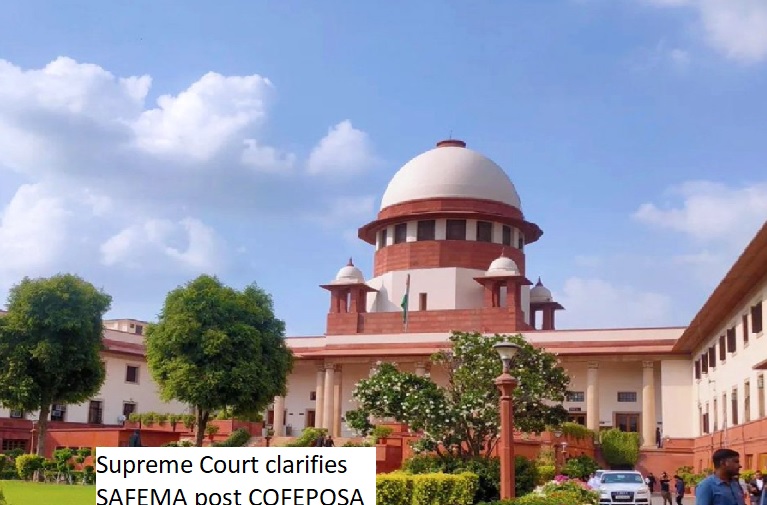


The Supreme Court, in a recent decision on November 10, provided clarification on the applicability of the Smugglers and Foreign Exchange Manipulators (Forfeiture of Property) Act, 1976 (SAFEMA) in cases where a detention order had been issued under the Conservation of Foreign Exchange and Prevention of Smuggling Activities Act, 1974 (COFEPOSA). The court held that SAFEMA would be applicable to individuals against whom a detention order had been passed under COFEPOSA, unless specific exceptions outlined in the proviso to section 2(2)(b) of SAFEMA were met.
Section 2 of SAFEMA delineates the scope of its application. Notably, sub-section (2)(b) stipulates that SAFEMA is applicable to individuals for whom a detention order has been issued under COFEPOSA, subject to certain conditions specified in the proviso. The matter was presented before Justice Vikram Nath and Ahsanuddin Amanullah.
The case in question involved two sets of appeals originating from the Division Benches of the Bombay and Delhi High Courts, both of which had upheld orders for the forfeiture of properties under SAFEMA. The appellants, dissatisfied with these decisions, brought their challenges to the Supreme Court. It is crucial to highlight that before the SAFEMA proceedings, a detention order under COFEPOSA had been initially issued but was later withdrawn or revoked.
The central argument presented by the appellants rested on the premise that, since the detention order under COFEPOSA had been subsequently withdrawn or revoked, the proceedings under SAFEMA, as per section 2(2)(b) of the latter, would not be maintainable. The contention was that SAFEMA's provisions could only be applied to individuals for whom a detention order was in force under COFEPOSA. Once the COFEPOSA detention order was revoked, there would be no basis for the application of SAFEMA.
Contrary to the appellant's position, the Union argued that SAFEMA would not be applicable only when the revocation occurred due to reasons specified in the four clauses of the proviso. In other words, SAFEMA would not apply if the revocation fell within the circumstances outlined in the proviso to section 2(2)(b).
The Court, at the outset, observed that, barring the four contingencies outlined in the proviso of section 2(2)(b) of SAFEMA, the act would apply to every person against whom a detention order had been issued under COFEPOSA. Subsequently, the Court delved into an examination of the present case in light of these contingencies.
In essence, the Supreme Court clarified that SAFEMA's applicability extends to individuals against whom a detention order was issued under COFEPOSA, with specific exceptions outlined in the proviso. The revocation of a COFEPOSA detention order alone does not render SAFEMA inapplicable, unless the revocation aligns with the conditions specified in the proviso. This ruling provides clarity on the interplay between COFEPOSA and SAFEMA and sets a precedent for cases involving the forfeiture of properties under these acts.
TAGS: Supreme Court SAFEMA COFEPOSA detention order property forfeiture proviso section 2(2)(b) appeals Bombay High Court